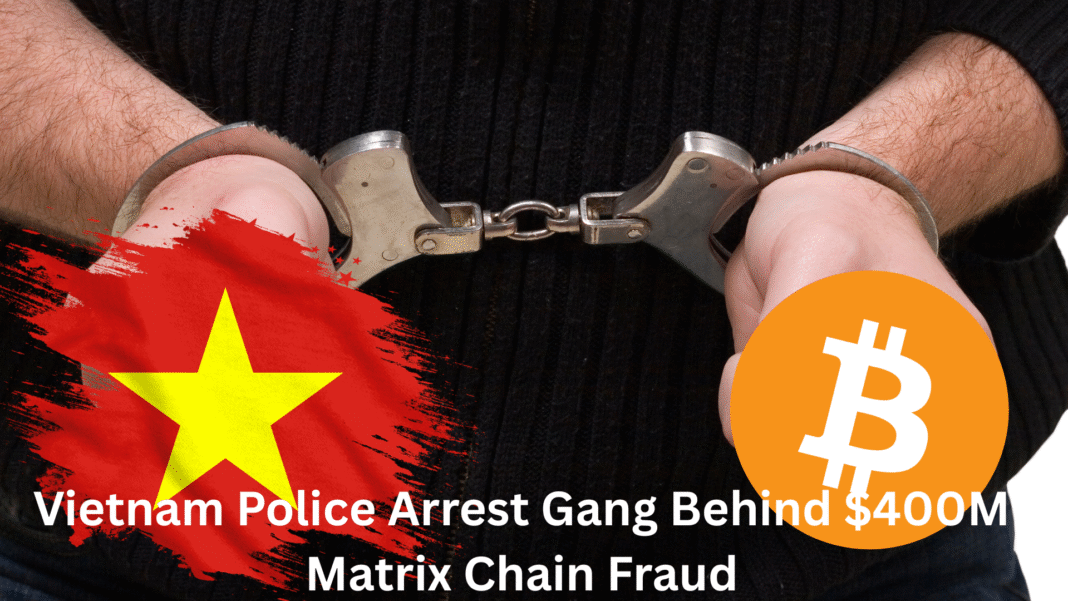Authorities in Dong Nai Province arrested key members of a group accused of running a massive crypto scam called Matrix Chain.
The gang allegedly defrauded tens of thousands of people across Vietnam, collecting nearly 10 trillion VND (about 394.2 million USDT) through a fake virtual currency exchange.
A coordinated operation involving multiple provinces brought the case to light and arrested the four accused Nguyen Quoc Hung, Bui Thi Thanh Nga, Ho Long Tri, Dinh Huu Hay, and Than Van Hiep.
Discovery and Investigation
In early 2024, Dong Nai Provincial Police began investigating suspicious online activity related to a new virtual currency exchange known as MTC, or Matrix Chain.
The group behind MTC set up a multi-level marketing scheme that lured investors with promises of huge profits. Investigators found that participants were asked to invest in a worthless token while believing they were joining a legitimate exchange.
As more signs of fraud appeared, the Financial Services Commission and Financial Supervisory Service launched a fast-track inquiry in October 2024.
The Seoul Southern District Prosecutors’ Office’s Virtual Asset Crime Joint Investigation Unit helped collect evidence that led to the January 3 arrests of the main suspects.
Coordination Across Provinces
To dismantle the operation, Dong Nai Provincial Police worked with the Department of Investigation Police on Social Order Crimes under the national Ministry of Public Security.
They also teamed up with Hanoi City Police, Ho Chi Minh City Police, and law enforcement in Hung Yen, Binh Dinh, Dak Lak, Gia Lai, and Bac Giang provinces.
“Many elite officers and soldiers” spent 200 days on the case, according to the ministry’s statement. On May 19, coordinated raids led to the arrest of the ringleaders and searches of their homes and workplaces.
Modus Operandi and Illicit Profits
Prosecutors allege that suspect Nguyen Quoc Hung contacted anonymous developers on Telegram in February 2023 to create the Matrix Chain software on the SafePal e-wallet platform.
Hung paid about 20,000 USDT (roughly 520 million VND) for the software. He then partnered with accomplice Bui Thi Thanh Nga, who contributed 400 million VND to the project.
Investors had to pay one USDT (about 26,000 VND) into a “platform fee wallet” on SafePal to participate. Hung and Nga directed funds from this wallet. About 40% went to regional leaders, 5% covered marketing and events, and the remaining 55% was used by Hung and Nga for personal expenses.
Also Read: Vietnam’s PM Orders Urgent Proposal For Cryptocurrency Legal Framework By March 2025
When Matrix Chain launched on the PancakeSwap exchange, Hung kept a separate SafePal wallet holding around 100 million MTC coins. He used these coins to manipulate the token’s value and to withdraw USDT that participants deposited.
Fugitives and Ongoing Inquiries
The group’s broker is believed to have arranged many coin sales but fled overseas before his arrest. Prosecutors have requested an international arrest warrant and suspended the indictment until he is detained.
Industry insiders fear other accomplices may also have escaped abroad with more assets. Hung and Nga have confessed to their roles, but they deny specific allegations about how each transaction manipulated market prices.
Regulatory Developments in Vietnam
In related news, the Monetary Authority of Singapore and Vietnam’s Securities Commission recently announced a partnership to strengthen regulatory oversight of digital assets.
The two agencies aim to create a unified framework for Vietnam’s growing crypto sector while safeguarding market integrity. Vietnam is also proposing a pilot program for issuing and trading cryptocurrencies, along with a coordinated oversight system involving three key agencies.
The Matrix Chain case highlights how sophisticated crypto fraud can evolve and spread quickly across regions. With law enforcement working day and night to expose the scheme, Vietnam’s authorities are sending a clear message that digital asset crimes will not go unpunished.
Also Read: Vietnam To Launch State-Licensed Digital Asset Exchange In March Amid Growing Crypto Regulations


